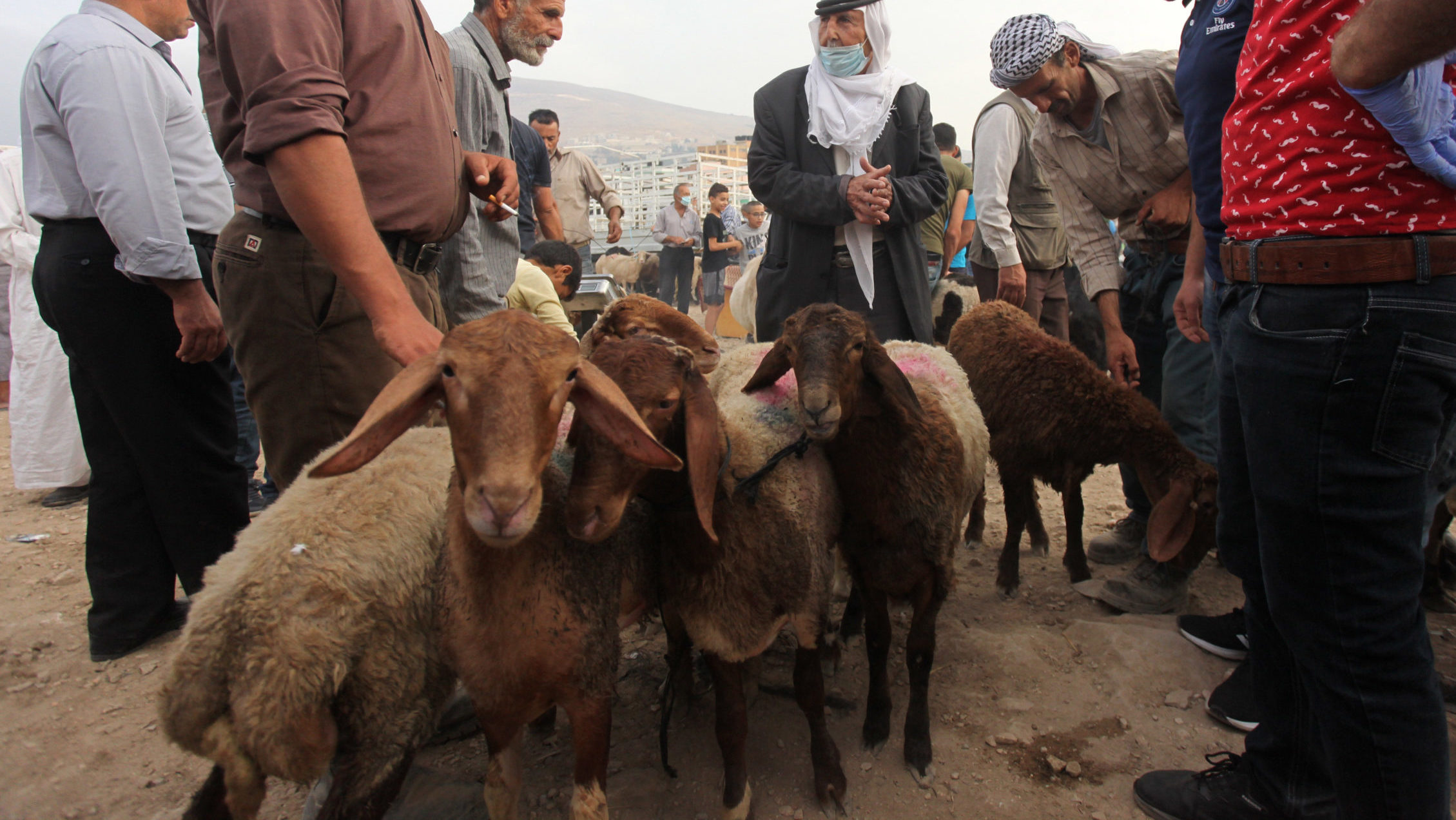Pandemic to Put Damper on Eid al-Adha for Palestinians
Bad economy, health restrictions reinstated due to infection surge expected to take joy out of holiday that begins Friday
Sadness and disappointment are sure to hang over Eid al-Adha – the normally joyous Muslim festival of the sacrifice – in the West Bank this year due to a suffocating financial crisis and full lockdown of all Palestinian cities in light of a resurgent coronavirus pandemic.
The four-day holiday begins on Friday.
During Eid al-Adha, Muslims everywhere normally pray at mosques, give gifts and sacrifice lambs, sheep, calves or other livestock. This helps them feel closer to God and feeds their families, relatives and the poor.
They exchange family visits to dine together in an atmosphere of joy and share sweets and stories while sporting brand-new clothing.
However, things are far from normal in the Palestinian territories this year.
Ibtisam Alqam, a mother of five from Hebron and a teacher employed by the Palestinian Authority, says she is unable to buy livestock for the sacrifice because of very tight finances.
“We can barely provide the basics for the family,” she told The Media Line.
We can barely provide the basics for the family
This year, an animal for sacrifice typically costs 500 Jordanian dinars, about $700.
Alqam adds that even the cookies and sweets her family usually prepares together will not be provided this year.
“I have three university students who have fees and other expenses to pay. So after I cover basic expenses, I can’t pay for any extras,” she said.
The PA was unable to pay its employees’ May salaries. On Sunday, it announced that half of June’s salary would be paid before the holiday.
Its financial difficulties stem from a variety of factors, most importantly its refusal to accept so-called tax-clearance monies collected by Israel, which make up 60% of its budget. The refusal stems from cutting ties with Israel over its plan to annex parts of the West Bank.
The PA has more than 43,000 employees, and their salaries normally account for about 20% of the Palestinian GDP.
Alqam explains that this year, the holiday has put heavy pressure on parents.
“We can’t buy new clothes and we have to stay in the house, so there will be no family visits or dining together in large groups,” she said, adding that she could afford new clothing only for her youngest children.
“We don’t have money to buy the sacrifice and we can’t even leave the house. This Eid is completely different,” she said.
On Monday evening, the PA government announced a series of health restrictions for the holiday period.
Group prayer can be held only outside in public squares. Worshipers must wear facemasks, bring their own prayer carpets and maintain proper social distancing. Prayers, including the sermon, will be limited to just 15 minutes.
There is also to be a ban on travel between governorates and a complete lockdown from Friday morning until Sunday morning.
The restrictions, however, say nothing about the sacrifices, where people usually slaughter a sheep, lamb or calf after Eid prayers outside their home or at a butcher’s shop in order to distribute meat to relatives and the poor.
Omar Nabali, spokesperson for the West Bank Association of Butcher Stores, told The Media Line that the holiday period was usually the busiest time of the year and accounted for a significant part of their annual income.
“We are currently contacting the governorates and the chambers of commerce in order to have the government officially announce that people can [move around] within their cities to perform the sacrifice ritual by going to butchers,” he said.
Nabali expressed disappointment that butcher shops were included in the PA’s closure edict.
“The government exempted pharmacies and bakeries, but not us,” he said. “That’s not right. We are at our busiest at this time of year and are waiting for an official decision [to change the order] as we can’t really move forward without it.”
Prices are the same as last year, but demand has dropped by 90%, Nabali says.
“People don’t have money to buy sacrifices this year – the financial situation in the West Bank is very bad. And no matter what the price might be, people still wouldn’t be able to afford it,” he stated.
People don’t have money to buy sacrifices this year – the financial situation in the West Bank is very bad. And no matter what the price might be, people still wouldn’t be able to afford it
Earlier in July, dozens of merchants and business owners staged a rally in downtown Ramallah and other Palestinian cities to highlight the financial woes caused by repeated closures, demanding that markets be allowed to remain open as they had run up debts and other commitments.
The PA Prime Minister’s Office told The Media Line that based on this year’s medical protocol, citizens in cities would be allowed to pick up their sacrifices from butcher shops ahead of time, and those in villages would be allowed to slaughter sacrificial animals outside their home.
Yousef al-Kahteeb, a businessman from a village near Bethlehem, told The Media Line that he would sacrifice a calf, like he does every year.
“It will be the same as last year’s sacrifice, but because of the coronavirus, we will be quarantining in the house, so we can’t have the usual family gathering to eat mansaf,” he said, referring to a traditional Arab rice dish that is usually served with meat from the sacrifice.
Kahteeb says he ordered his sacrificial calf only this week, as this year the holiday “does not have the usual momentum” because of the pandemic and resulting closures.
People in many Middle Eastern countries have increasingly resorted to purchasing a “virtual sacrifice” online. This service has been on offer in past years but the practice has gained in popularity during the pandemic.


